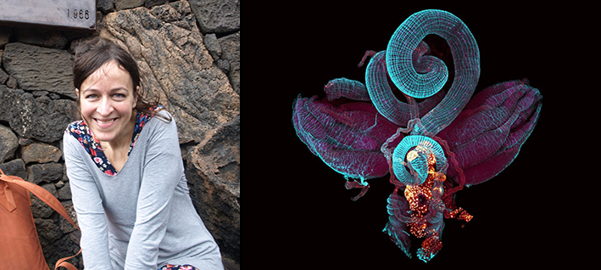By Jenna Stevens-Smith
April 6, 2018
Time to read: 5 minutes
Irene Miguel-Aliaga awarded ERC Advanced Grant

On the back of a five-year European Research Council (ERC) Starting Grant, Professor Irene Miguel-Aliaga, Head of Gut Signalling and Metabolism at LMS, has been awarded an ERC Advanced Grant, obtaining €2.5 million in funding for the next five years.
The ERC Advanced Grants are given to well-established top researchers who have a recent high-level research track-record and profile which identifies them as leaders in their respective field(s). The ERC Advanced Grants enable researchers to pursue ground-breaking, high-risk projects. Irene is the recipient of one of six ERC Advanced Grants awarded to Imperial researchers and one of only 269 awarded in total throughout the EU during this previous year’s funding round.
Irene’s ERC Starting grant saw her researching the diversity of the nerve cells around the gut, during which she found the plastic potential of organs during reproduction. Discussing her research interests, Irene said:
“I have a general interest in organ plasticity, how the internal organs change during development and over their life time. Changes in organ size/shape and volume occur in response to different events that happen to the organism such as reproduction. I am also interested in understanding how organs differ between males and females.”
Her new ERC Advanced grant entitled “Sex differences in intestinal plasticity” will see Irene tackle both of these research areas.
Research
Irene’s group explores what happens to the gastrointestinal tract and associated neurons during reproduction using flies and mice as model organisms. They want to further explore the sex differences in increased depth including the male and female lining of the intestine, the cells that line the inside of blood vessels and nerve cells. They will then come up with answers to the question of why these differences exist and the processes that occur to make the changes during reproduction and development.
Collaboration
Irene will continue to collaborate with groups at LMS and Imperial, such as Dr Bryn Owen and Dr Santiago Vernia, as well as institutes outside the MRC both within the UK and internationally during her research.
The €2.5 million funding over the next five years will provide resources to support post-doctoral researchers and PhD students in the Miguel-Aliaga Lab. Irene values her researchers and said: “The finding of sex difference in intestinal physiology stemmed from preliminary research initially conducted by a former graduate student, Paola Cognigni, then followed by extensive work by Dr Bruno Hudry, EMBO Advanced Fellow in the group.” Bruno first joined the Miguel-Aliaga Lab in 2013 through an EMBO Long-Term Fellowship. Due to the exceptional progress made during his postdoctoral work in 2015 Bruno was awarded an EMBO Advanced Fellowship. Bruno will be setting up his own lab back in his native France this year. Work by other members of the lab, such as Dr Dafni Hadjieconomou, Dr Alexandra Milona and George King, also featured in the application.
ERC Grant scheme
ERC Grants are part of the EU’s Horizon 2020 programme for Research and Innovation which aims to generate more breakthroughs, discoveries and world-firsts. The ERC has three core grant schemes: Starting Grants, Consolidator Grants and Advanced Grants. To date, the ERC has funded some 8,000 top researchers at various stages of their careers, and over 50,000 postdocs, PhD students and other staff working in their research teams. The ERC strives to attract top researchers from anywhere in the world to come to Europe.
Professor Irene Miguel-Aliaga is Head of the Gut Signalling and Metabolism group in the MRC London Institute of Medical Sciences and Professor of Genetics and Physiology in the Institute of Clinical Sciences at Imperial College London. Irene was featured in our recent article celebrating International Women’s Day The Women Behind the Images – #IWD2018.
Biography
Professor Miguel-Aliaga received a D.Phil. in Genetics from the University of Oxford, UK, where she developed invertebrate models of human disease with Professor Dame Kay E. Davies. She conducted her postdoctoral work with Professor Stefan Thor, first at Harvard, USA and then Linkoping University, Sweden, where she identified the first genetically defined enteric neurons in Drosophila. Irene was awarded a Marie Curie Fellowship to undertake further postdoctoral work with Professor Alex Gould at NIMR, London, where she uncovered similarities between the specification of gut-innervating insulin-producing neurons in flies and pancreatic beta cells in mammals. In 2008, she obtained an independent Wellcome Trust Research Career Development Fellowship to capitalize on the study of the enteric nervous system in Drosophila, first at the University of Cambridge and then in London. Irene was a recipient of an ERC Starting Grant in 2012, was elected to the EMBO YIP programme in 2012, and became a full EMBO member this year.
For further information, contact:
Dr Jenna Stevens-Smith
Head of Communications and Engagement
MRC London Institute of Medical Sciences
Du Cane Road
London W12 0NN
M: 07714 051 445
E: